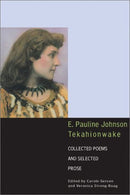Description
E. Pauline Johnson Tekahionwake: Collected Poems and Selected Prose edited by Carole Gerson and Veronica Strong-Boag contains a generous selection of E. Pauline Johnson's (1861-1913) poems and prose writings. This collection includes 169 poems organized chronologically into periods such as The Early Years: Beginnings to 1888; The Prolific Years: 1889-1898; Later Years: 1899-1913; and Anonymous and Pseudonymous Poems. Readers familiar with Johnson's lyrical and narrative poetry will find her best-known such as A Cry from an Indian Wife, As Red Men Die, The Song My Paddle Sings and The Cattle Thief as well as her nature verse and romantic poems. The editors include an introduction that recounts the main biographical data of the Mohawk performer's life, her career that took her across Canada and overseas to England, and her publishing history. They also describe their editorial process and corrections to particular poems and stories and their perspective on E. Pauline Johnson's place in Canadian literature as a "Mixed-race New Woman". The book includes 19 of Johnson's prose works including her retelling of legends especially those from British Columbia, short stories, and non-fiction essays. The prose works expand our understanding of Johnson as a woman with distinct opinions on race and gender roles. One essay in particular, A Strong Race Opinion: On the Indian Girl in Modern Fiction, takes firm aim on current literature of the times as it relates to the portrayal and depiction of Native Women. Many of Johnson's arguments and concerns can easily be understood by contemporary Native People who still find grotesque stereotypes of Aboriginal women in popular culture. The book contains detailed notes on each entry that describe the writing and publishing of texts and about copy texts. Scholars will find this beneficial. Paddling Her Own Canoe by Gerson and Strong-Boag is the earlier companion piece to this present volume and so the editors have not included their extensive bibliography of Johnson's works in this edition. The general reader and literary scholar will find something of interest in this extensive collection of the works of E. Pauline Johnson. While some may find Johnson's vocabulary tainted with the British colonial mentality, her essays contain interesting subject matter especially Forty-Five Miles on the Grand, The Iroquois Women of Canada, and The Silver-Craft of the Mohawks: The Protective Totem. Readers should know that Pauline Johnson's family was Anglican and that her view of the traditional Longhouse community at Six Nations was tainted by this prejudice. Her short story, We-hro's Sacrifice, about an Onondaga boy's white dog that becomes an integral part of the "White Dog Ceremony" was first published for a white audience in a boy's magazine in 1907. The story draws connections to a family pet and a child's sacrifice of the beloved animal for the higher purpose of his cultural community. Unfortunately Johnson uses terms such as pagan and idol throughout this story as she fails to fully comprehend the Longhouse worldview. Nevertheless this book should be part of all public library collections because Pauline Johnson's work is presented here in its most comprehensive edition.


